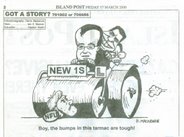Fishing policies
Although the report was quite obviously political and designed to try to undermine the SNP policy warm noises towards the fishing industry, the underlying issues require more detailed consideration.
First a disclosure: I act for some fishermen operating in the Western Isles.
Let's start by considering the desire to provide financial support to the industry at the time of high fuel prices. I know just how this is affecting fishermen, making boats barely viable and affecting the crew earnings very substantially. The proposal from Richard Lochhead, Fisheries Minister, to set up a commission (to think about maybe considering some solutions that they might give to the Minister for him to think about and maybe do something about, after due consideration, legal advice and a suitably long delay until just before the next election), was obviously nothing but an intended sop to his electorate dressed up in grandiose terms as a 'policy'. Politically very astute for his electorate, but unworkable and undeliverable in the long term.
Again the SNP have fallen into the trap of making undeliverable promises which can only let people down – which the voters remember much longer than the actual achievements.
The problem with the waffle policy was not the desire to help a particular industry, but the lack of thought given to the practicalities of such a policy. Why only fishermen? Why not farmers, hauliers or even accountants?
Well, to one extent it doesn't really matter as State Aid rules would have prevented any meaningful subsidy.
Withdrawal from the Common Fisheries Problem Policy is – the House of Lords tells us – not a viable option, and it identifies the key problem as being overcapacity in the industry.
Right and wrong, in my view.
Overcapacity is the issue and one that is being avoided by all parts of the industry. I remember Stornoway Harbour being filed with fishing boats, all of whom earned a living. Today, there is perhaps 10% of that number, almost all of whom are struggling.
The problem for us in the islands lies with the enormous vessels coming into the area and hoovering the sea empty.
As long as the CFP exists this waste and destruction will continue in it's unmitigated, unsustainable, form. There are no options as long as other nations can prevent restrictions being placed on industrial fishing.
That is why there is a need to have a debate on the CFP and on the other aspects of closure European integration. If you support closer integration, then you have to accept the consequences; if you oppose closer integration, then you must question why we allow destructive policies to be pursued when better alternatives exist.
It is time to review our relationship with the rest of Europe and to place that relationship in the context of our national requirements and aspirations, and the costs and benefits of the different ways forward.







No comments:
Post a Comment